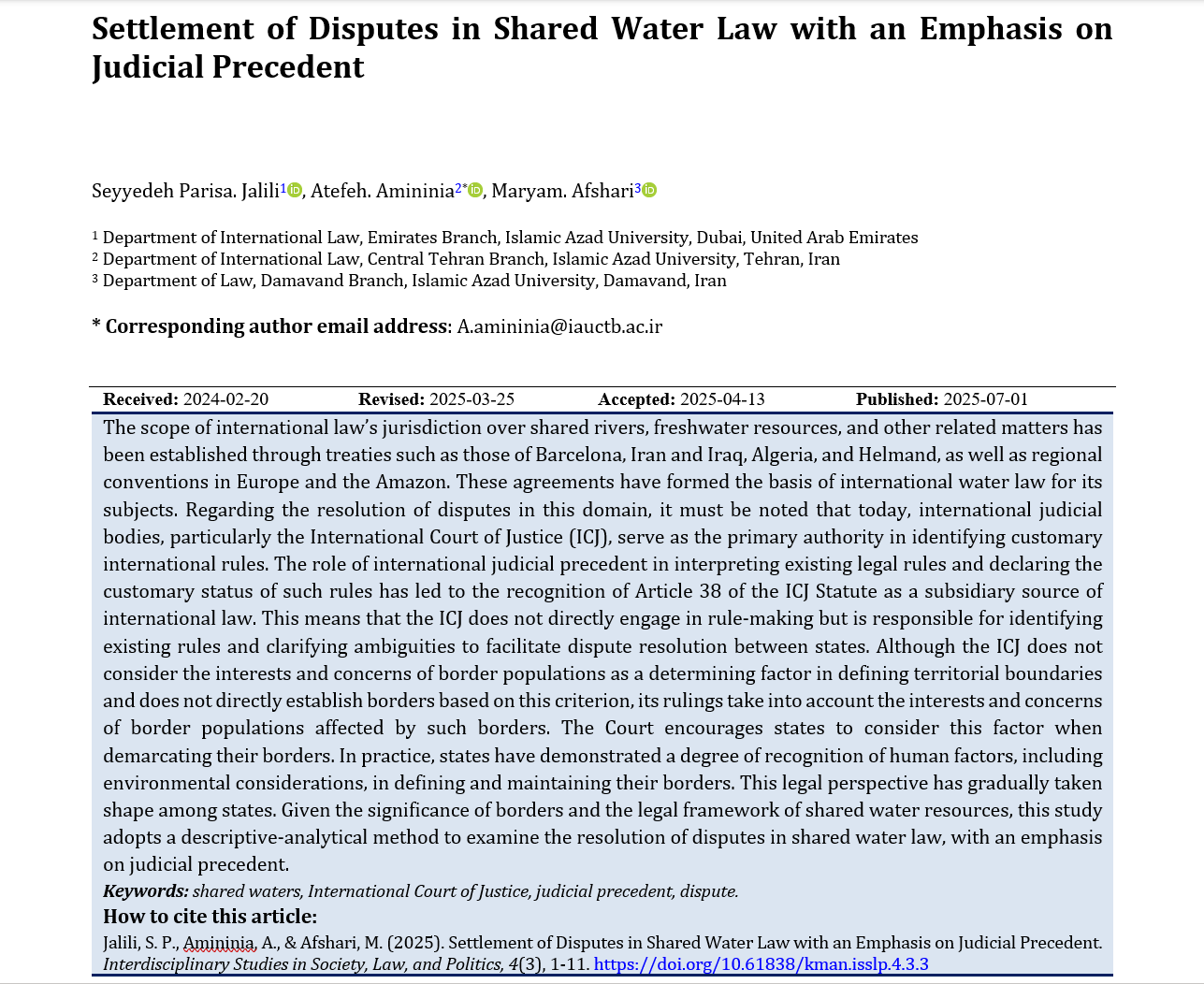Settlement of Disputes in Shared Water Law with an Emphasis on Judicial Precedent
Keywords:
shared waters, International Court of Justice, judicial precedent, disputeAbstract
The scope of international law’s jurisdiction over shared rivers, freshwater resources, and other related matters has been established through treaties such as those of Barcelona, Iran and Iraq, Algeria, and Helmand, as well as regional conventions in Europe and the Amazon. These agreements have formed the basis of international water law for its subjects. Regarding the resolution of disputes in this domain, it must be noted that today, international judicial bodies, particularly the International Court of Justice (ICJ), serve as the primary authority in identifying customary international rules. The role of international judicial precedent in interpreting existing legal rules and declaring the customary status of such rules has led to the recognition of Article 38 of the ICJ Statute as a subsidiary source of international law. This means that the ICJ does not directly engage in rule-making but is responsible for identifying existing rules and clarifying ambiguities to facilitate dispute resolution between states. Although the ICJ does not consider the interests and concerns of border populations as a determining factor in defining territorial boundaries and does not directly establish borders based on this criterion, its rulings take into account the interests and concerns of border populations affected by such borders. The Court encourages states to consider this factor when demarcating their borders. In practice, states have demonstrated a degree of recognition of human factors, including environmental considerations, in defining and maintaining their borders. This legal perspective has gradually taken shape among states. Given the significance of borders and the legal framework of shared water resources, this study adopts a descriptive-analytical method to examine the resolution of disputes in shared water law, with an emphasis on judicial precedent.
Downloads
References
Avorideh, F. (2016). A comparative study of international principles and rules governing water allocation in transboundary rivers. Environmental Sciences Quarterly, 14(2).
Azizi, S., & Mousavi, S. M. (2016). The Gabčíkovo-Nagymaros case: The role of the International Court of Justice in highlighting the concept of sustainable development. International Legal Journal, 55.
Bahiraei, K., & Manouri, H. (2023). Opportunities for realizing democracy in the Constitution of the Islamic Republic of Iran Islamic Azad University, South Tehran].
Baripour, M. (2022). Policy-making methods for water in transboundary rivers. Strategic Macro Policies Quarterly, 10(2).
Bostian, I. L. (1997). The International Court of Justice Decision concerning the Gabčíkovo-Nagymaros Project (Hungary/Slovakia). Colorado Journal of International Environmental Law and Policy.
Doczi, Z. (2014). Gabčíkovo-Nagymaros Project Case 1997 (ICJ). Legal Studies, 3(1).
Drysdale, A., Blake, G. H., & Mohajerani, M. (1995). Political geography of the Middle East and North Africa. Tehran: Ministry of Foreign Affairs Publishing.
Fazlali Sarkani, M. (2021). Methods for resolving environmental disputes arising from international treaties. Environmental Journal, 19(2).
Habibi, M. H., Gundlein, L., Huysman, J. W., Halpap, E., & Shelton, D. (2016). Environmental law (Vol. 2). Tehran: University of Tehran Press.
Jafari Valadani, A. (2001). Iran and international law. Tehran: Pazina Publishing.
Mirfakhraei, S. H., & Khodai, M. (2021). Water crisis and new regional and international legal frameworks. Iranian Journal of International Politics, 9(2).
Prescott, V., & Triggs, G. D. (2008). International Frontiers and Boundaries. Martinus Nijhoff Publishers, Leiden, Boston.
Rashidi, M. (2019). Examining states' obligations regarding water security in international law. Legal Studies, 11(2).
Rashidi, M. (2021). The source of the obligation to assess transboundary environmental impacts in the GAP project in Turkey. Contemporary Legal Studies Journal, 12(22).
Saber Rad, M. (2016). Rules for determining land borders in international judicial decisions Imam Reza University].
Sadat Meydani, S. H. (2009). International Court of Justice: Evidence for proving claims. Tehran: Jungle Publishing.
Salman, S. M. a. (2007). The Helsinki Rules, the UN Watercourses Convention and the Berlin Rules: Perspectives on International Water Law. International journal of water resources development. https://doi.org/10.1080/07900620701488562
Special Rapporteur. (1981). Third Report on the Law of Non-Navigational Uses of International Watercourses. U.N. Doc. A/CN.4/348(Dec.11, 1981) (by Stephen Schwebel)
Szabo, M. (2009). The Implementation of the Judgment of the ICJ in the Gabčíkovo-Nagymaros Dispute. Environmental Policy and Law, 39.
Tanaka, Y. (2013). Reflections on the Territorial and Maritime Dispute between Nicaragua and Colombia before the International Court of Justice. Leiden Journal of International Law, 26(4). https://doi.org/10.1017/S0922156513000460
Taylor, P. (1999). The Case concerning the Gabčíkovo-Nagymaros Project: A Message from the Hague on Sustainable Development. New Zealand Journal Environmental Law, 39.
Zamani, Q. (2022). The concept and scope of the principle of reasonable and equitable utilization of shared water resources from the perspective of international law. Scientific-Research Journal of Public Law, 24(75).

Downloads
Additional Files
Published
Submitted
Revised
Accepted
Issue
Section
License
Copyright (c) 2025 Interdisciplinary Studies in Society, Law, and Politics

This work is licensed under a Creative Commons Attribution-NonCommercial 4.0 International License.





